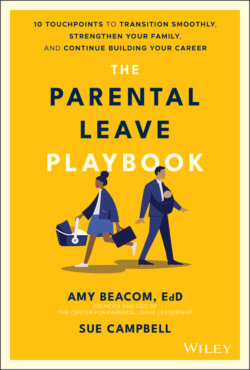Читать книгу The Parental Leave Playbook - Sue Campbell - Страница 15
Language Matters: Defining Parental Leave
ОглавлениеInclusivity is vital to our workplaces and our society. In this book I am using the broadest definition of family and parenting in order to support all parents, across all races, religions, gender identities, and sexual orientations. I'm speaking to you no matter what method you have chosen to form a family, be it birth, adoption, surrogacy, fostering, or another creative way. Notice that the language and imagery customarily used for parental leave issues are still problematically heteronormative and skew toward assuming a traditional birth as the path to parenthood. (Even the terms mom and dad do not always adequately label trans or nonbinary parents.) My goal is to always be inclusive, but there are places where the language (and even my awareness) has not yet caught up with the evolution of family structure. Using inclusive language is a simple way to show we care for each other. Let's work together to help influence this culture shift, and let's also give each other grace and understanding when we aren't yet able to get it exactly right. If you are becoming a parent, this book is for you.
Next, we need to define the term parental leave. When most people hear these words, they still think of maternity leave: the time a mother (because let's admit it, dads are still largely ignored) is absent from work to be at home with her new baby and recover from childbirth. This is a very limited view that (unintentionally) reinforces prejudices and inequity and misses the bigger picture and the opportunities inherent in this major life transition. Parental leave describes any leave, inclusive of all gender identities, that provides time off from work to bond with a new child.
Using a time-based definition has proven to be holistic and productive for my clients. Therefore, let us define parental leave as an extended period of transition for all new parents in three phases: (1) preparing for leave, (2) during leave, and (3) returning from leave. This transition lasts roughly from the time you announce the upcoming arrival of your child through your return to work, and it also includes an indefinite period of adjustment after your return that can last anywhere from three to six months or longer. Altogether, we are talking about at least nine to 12 months—maybe more—of your life.
Although I have written this book with the idea that your parental leave will last longer than a few weeks, we will discuss aspects of this important transition that affect all expectant and new working parents, even those who are not taking leave at all.
Finally, the language I use in the book is geared toward people who are traditionally employed (those who work for a company or organization and have a boss over them) because that is still the majority of workers in the United States. However, these touchpoints are equally applicable to you if you are a freelancer, an entrepreneur, run a nonprofit, or do any other type of work. Even if you're not formally employed, you will still find value in thinking through how these touchpoints apply to your transition to parenthood. They are universal.
